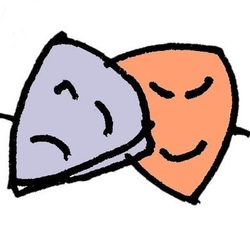Introducing the Life Domains
In order to keep some degree of consistency in the use of the Inclusion Web, there are some specific aspects of each of the life domains that need to be borne in mind.
The life domains have been chosen because these are the areas of life that offer the best opportunity to establish positive roles and relationships with others. Simply using community amenities, such as shopping, helps people develop independent living skills and can deepen friendships with people who go shopping together, but it provides few opportunities to start new friendships. In contrast, joining a community allotment association to grow food together will provide many opportunities to develop acquaintances and friendships, as well as to become established in a positive role in that community. Most friendships we enjoy have begun on one of the life domains named on the Inclusion Web.
Similarly, the life domains focus on relationship and role opportunities, rather than private leisure activities. So, for example, the Inclusion Web explores whether people are attending a college course, rather than undertaking private study. Solitary activities may improve fitness, knowledge or general wellbeing, but the focus of the Inclusion Web is combating isolation and the loss of positive social roles.
Many activities do not fall neatly into one life domain, but can be considered to have elements of two or more domains. The following paragraphs help people to decide which life domains to record particular activities in. Ultimately it’s up to the person and supporter – the important thing is to be consistent between the two Webs.
Arts and Culture
 Sometimes people think of sophisticated artistic and cultural activities here, as if artistic creativity is an elitist activity confined to people with exceptional talent. In contrast, this section includes the whole range of creative and cultural activities, not just those that might be deemed elitist – eg. a Karaoke night is just as valuable as going to the opera.
Sometimes people think of sophisticated artistic and cultural activities here, as if artistic creativity is an elitist activity confined to people with exceptional talent. In contrast, this section includes the whole range of creative and cultural activities, not just those that might be deemed elitist – eg. a Karaoke night is just as valuable as going to the opera.
Employment
 This is waged employment at the national minimum wage rate or better, in a mainstream job alongside members of the public. A sheltered workshop (even if it paid good wages) would be counted as part of the Services segment, as it provides few opportunities to build relationships with co-workers who do not use health or social care services. Contact with customers does not really count here as we build our strongest connections with our co-workers rather than our customers.
This is waged employment at the national minimum wage rate or better, in a mainstream job alongside members of the public. A sheltered workshop (even if it paid good wages) would be counted as part of the Services segment, as it provides few opportunities to build relationships with co-workers who do not use health or social care services. Contact with customers does not really count here as we build our strongest connections with our co-workers rather than our customers.
Identity
 Three groups are included here, making it perhaps the most diverse of the life domains. Firstly, there are groups gathered around a specific set of beliefs or identity, such as an ethnic identity, sexual orientation or religion. Second, groups that share an idea of how to make the world a better place to live in – mostly political or campaigning groups. Third would be any groups that share a passion that gives the members some common sense of purpose, whether it be collectors, students of history or whatever. What holds this life domain together that that deep sense that this is central to who I am as a person.
Three groups are included here, making it perhaps the most diverse of the life domains. Firstly, there are groups gathered around a specific set of beliefs or identity, such as an ethnic identity, sexual orientation or religion. Second, groups that share an idea of how to make the world a better place to live in – mostly political or campaigning groups. Third would be any groups that share a passion that gives the members some common sense of purpose, whether it be collectors, students of history or whatever. What holds this life domain together that that deep sense that this is central to who I am as a person.
Family and Neighbourhood
 For many of us, being a good neighbour and building a shared community with the people who live close by is an important way of being included in the community. This can be especially important to us at certain times of life – eg. during our childhood or older age. The person’s home can be included on the ‘places’ part of the ‘families and neighbourhoods’ domain..
For many of us, being a good neighbour and building a shared community with the people who live close by is an important way of being included in the community. This can be especially important to us at certain times of life – eg. during our childhood or older age. The person’s home can be included on the ‘places’ part of the ‘families and neighbourhoods’ domain..
Learning
 This is attending college, university or evening classes open to the general public. Attending a course at the day centre would count as a Services activity. Attending a class in the ordinary college would count as a Learning place, but if all of the other students in the class also used the same health or social care service as the person, then the ‘people’ contacts would fall into the Services segment. While solitary learning, such as reading a book alone in your bedroom, is a valuable activity, our focus here is on learning as an opportunity to build a positive social role and potentially to make friends.
This is attending college, university or evening classes open to the general public. Attending a course at the day centre would count as a Services activity. Attending a class in the ordinary college would count as a Learning place, but if all of the other students in the class also used the same health or social care service as the person, then the ‘people’ contacts would fall into the Services segment. While solitary learning, such as reading a book alone in your bedroom, is a valuable activity, our focus here is on learning as an opportunity to build a positive social role and potentially to make friends.
Online
 Electronic connections (via phone, text messages, email, internet chatrooms, online gaming, Facebook, MSN and the like) are vitally important for many people. Online ‘places’ are those places where one can ‘lurk’ and watch the online behaviour of others without creating person-to-person relationships. Some people maintain contact with their farflung relatives and friends via Zoom or Facebook, while others meet their future partner through online dating and some pursue a hobby or interest via internet research and make significant connections through the intenet.
Electronic connections (via phone, text messages, email, internet chatrooms, online gaming, Facebook, MSN and the like) are vitally important for many people. Online ‘places’ are those places where one can ‘lurk’ and watch the online behaviour of others without creating person-to-person relationships. Some people maintain contact with their farflung relatives and friends via Zoom or Facebook, while others meet their future partner through online dating and some pursue a hobby or interest via internet research and make significant connections through the intenet.
Services
 Many people who have been in touch with health or social services for a long time live entirely within the ‘services’ sector and have nobody in any of the other life domains. Other people (sometimes described as ‘hard to reach or engage’) are not connected here either and might do well to increase their number of contacts with services and support.
Many people who have been in touch with health or social services for a long time live entirely within the ‘services’ sector and have nobody in any of the other life domains. Other people (sometimes described as ‘hard to reach or engage’) are not connected here either and might do well to increase their number of contacts with services and support.
Sports and Exercise
 This is more than taking exercise, but is the myriad of ways in which people come together with others through a shared interest in sports or physical activity. Walking the dog, wearing the colours of the local football team and meeting with friends to watch the Grand Prix on TV are all included here, as long as the activities bring people together.
This is more than taking exercise, but is the myriad of ways in which people come together with others through a shared interest in sports or physical activity. Walking the dog, wearing the colours of the local football team and meeting with friends to watch the Grand Prix on TV are all included here, as long as the activities bring people together.
Volunteering
 Some people volunteer in the same service that also supports them. This can be a useful experience, but the activity remains in the Services segment until the person joins the general public, volunteering alongside other citizens in a mainstream setting. Remember that volunteering can be informal and does not have to be authorised by a volunteer placement organisation.
Some people volunteer in the same service that also supports them. This can be a useful experience, but the activity remains in the Services segment until the person joins the general public, volunteering alongside other citizens in a mainstream setting. Remember that volunteering can be informal and does not have to be authorised by a volunteer placement organisation.

Recent Comments